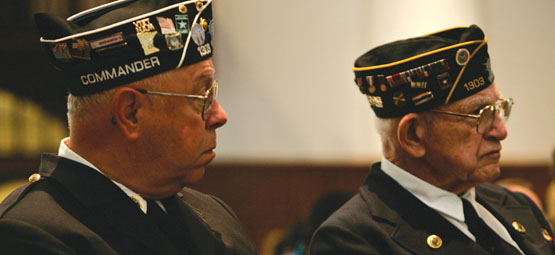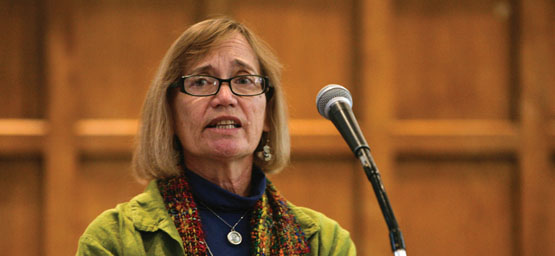Vassar & the Nation's Veterans

This past Veterans Day, more than 100 Vassar students, faculty, and staff, as well as middle and high school students from local public schools, packed the Villard Room for a special tribute to Vassar’s (and the nation’s) veterans. Organized by the college bookstore, the event featured a panel discussion moderated by psychology professor Randy Cornelius. Panelists included Vassar alumnae/i Christine Vassar Tall ’47, who came from England in 1940 to live at Prexy MacCracken’s house because her family feared for her safety during the Blitz; Leila Levinson ’76, whose father, a U.S. Army doctor, helped liberate the Nazi concentration camps and treat survivors, leaving him with what today might be characterized as post-traumatic stress disorder; and “Vassar Vet” Forrest Cousens ’50, who shared his story of fighting in the Battle of the Bulge, describing his experience as “long periods of boredom interspersed with moments of sheer terror.”
The scholarly work of our faculty also ties Vassar to our nation’s veterans. For example, Professor of History Maria Höhn has spent more than 15 years researching and writing about the experiences of American GIs, and especially African American GIs, in post-World War II Germany. Her groundbreaking work recently earned her a Distinguished Community Service Award from the NAACP.
Both Professor Höhn’s landmark research and the deeply moving Veterans Day event serve as reminders of all that we owe America’s veterans. As the U.S. military presence in Iraq has drawn to a close, it’s time for colleges such as ours to renew and increase that commitment.

In 1975, Arthur M. Okun published Equality and Efficiency: The Big Tradeoff, in which he wrote about the benefits of capitalism, but also about the values we should not willingly submit to the marketplace. Okun argues that some rights in our society should be distributed equally and should not “be bought and sold for money.” These include freedom of speech, the right to vote, and the right to practice religion freely. He also notes that some civic obligations, such as military service, should not be distributed by the market.
When the United States shifted to an all-volunteer military, military service ceased to be one of those obligations. A very unpopular draft during the Vietnam War, along with a period of relative peace, helped make military service more an employment or economic decision than an obligation to serve in combat.
In the last decade, the United States has been involved in two wars that have resulted in the deaths of more than 6,000 American service personnel while wounding more than 45,000. These burdens have been borne disproportionately by young men and women from low-income families, many of whom enlisted at least partly for economic reasons.
The veterans now returning home have helped make it possible for many young people—predominantly those from more
affluent families—to go from high school directly to college without worrying about being drafted for military service. That there has been so little objection to the wars in Iraq and Afghanistan on college campuses, in contrast to the Vietnam War, is at least partly due to our reliance on a “voluntary” military.

For a variety of reasons, it seems unlikely we will move away from a volunteer military anytime soon. The least we can do is open our doors to the returning veterans who make it possible for us to continue to avoid a military draft.
A number of colleges, including Vassar, are interested in recruiting veterans and have joined the Yellow Ribbon Program, which supplements the educational benefits veterans earn through the post-9/11 GI Bill®. But enrolling veterans is proving more difficult than we anticipated; perhaps they don’t think a college like Vassar is an obvious choice for them, especially given our preponderance of non-professional, liberal arts undergraduate programs and 18- to 23-year-old students.
However, institutions like Vassar devote more resources to each of our students than most, and we have some of the highest rates of graduation and success in sending students on to graduate work. And a good liberal arts education can prepare veterans, like all students, for the challenges they’re likely to face in the coming decades.
The skills nurtured by a Vassar education—including critical thinking, written and verbal communication, and teamwork—are precisely those that are valued in modern workplaces.
With more than two million veterans currently eligible for GI Bill® tuition benefits, and even more becoming eligible every year, a college like Vassar would be a good option for plenty of veterans.
While it’s challenging for our admissions office to attract qualified applicants among this group of men and women we have not traditionally recruited, we can take lessons from our recent successes in recruiting socioeconomically and racially diverse students. By committing to working together with our peer schools to identify a pool of veteran candidates and place them at Vassar and similar colleges, we hope to do our part to pay our debt to the young men and women who have borne the burden of our nation’s wars.
Portions of this column first appeared in an op-ed article by President Hill in the Philadelphia Inquirer.
